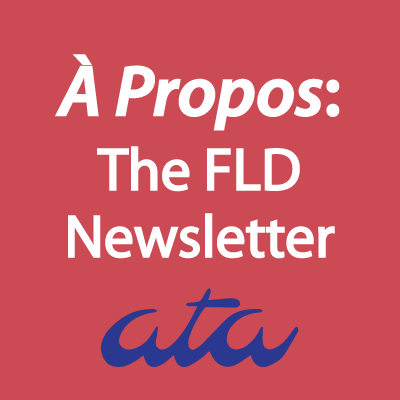
At the American Translators Association (ATA) conference in San Francisco in November 2016, I talked about Translating Poincaré. Instead of providing a summary for this blog of what turned out to be a very interesting talk, I’d like to discuss some related points that didn’t make it into that talk. My presentation discussed the book I translated, Sur le problème des trois corps et les équations de la dynamique, by Henri Poincaré. The book transformed the study of orbits in the solar system. Before the book was published, the motion of planets in the solar system, governed by Newton’s deterministic laws of motion and gravitation, was thought to run like clockwork, and most efforts were focused on the computation of positions of the planets and effective methods for doing those computations. In his book, Poincaré instead studied the differential equations (the actual mathematical form of the laws of motion) and their properties as a specific example of a dynamical system and was able to build the mathematical proofs and tools of dynamical systems theory. After the book’s publication, it was known that the stability of the solar system is not assured since it could be subject to chaotic behavior like other dynamical systems. Since the conference, I have signed a publishing contract with the publishing company Springer, and they are preparing my translation for publication.
Why this book?
I first heard of this book either around 1978 while I was an undergraduate at Cornell University or around 1982 while I was a graduate student in the astronomy department at Harvard University. I no longer remember the particular time or context although there are a few conceivable possibilities.
What is clear, many years later, is that I was in an environment that recognized, respected and understood (on some level) the importance of this book. And, it did so despite two obstacles. The first was of course its age; it was published in 1890. The other obstacle, from the perspective of a US academic environment, was the language; it was written in formal French with a specialized vocabulary demanded by the subject matter. In 1982, I spoke French that was fully adequate for many purposes. Yet it then seemed to me unlikely that I would be able to read and understand Poincaré’s work, so I made no effort to try. Together, this means that the book was a classic, but inaccessible to a large readership even though its existence was well known.
On the way from 1985 (when I was awarded a PhD) to 2014, my life and career experienced some strange twists and turns and sharp bumps and jolts. By then I’d become an established, independent translator from French into English working mostly with complex technical subjects.
One of the distressing realities of freelance work is the unpredictable switch between frenetic feeding frenzy and frustrating famine. In the spring of 2014, during one such famine, I started to look for stimulating intellectual activity to fill the time until the next feeding frenzy hit. I immediately focused my search on potential projects that could make a connection back to what I had once been: an astronomer and mathematical-physicist
In fairly short order I had a few ideas for projects involving dynamics and the stability of rotating astrophysical fluids. I talked to some people. I tried to assess the effort and resources that might be needed. While this route seemed plausible, it didn’t grab hold of my interest and hang on.
At the same time, my interest in Henri Poincaré’s work resurfaced. I found Poincaré to be a compelling author. I was very interested in carefully understanding what Poincaré had written. What better way to do that than to translate his book? I quickly found that it was easy to find scanned images of his works online. (The website hosted by the Université de Lorraine for the Henri Poincaré Papers, and its bibliography in particular, is very useful.) In addition to this book, I also looked at Les méthodes nouvelles de la mécanique céleste and his three books popularizing science (La Science et l’hypothèse, La Valeur de la science and Science et méthode).
These last four books all had existing translations of unknown quality. It was also clear that typesetting the equations in Sur le problème and Les méthodes nouvelles would require a significant effort. On the other hand, I recognized that I would likely find that effort satisfying. My presentation at the ATA conference discussed what was involved in typesetting the equations for one page.
I prepared a sample translation of a chapter from La Science et l’hypothèse, and after discussions with Maria Ascher and Michael Fischer—then at Harvard University Press—I decided to dive in and start translating Sur le problème, motivated by my interest in the author and subject.
As paying translation work flowed in, I translated patents and documents for clinical trials, and as that work ebbed, I went back to translating mathematical physics. In that way, I got two things that really interested me: stimulating intellectual activity and close, detailed study of a book and author that had long interested me.
Errors and Typos in the Source
The published version of Poincaré’s book that reached the public had a limited amount of lint, or distracting errors of a typographic nature not affecting the fabric of the work. I found twenty-six. For example, in one place the equation numbers advance from 3 to 5, and equation 4 does not appear anywhere else in that section. Nothing can be done about an error like that during translation, and so the error is replicated. On the other hand, on the next page the first subscript, ,was incorrect, but I could easily correct it to . With other similar errors, I corrected them unobtrusively.
My Approach to the Translation
In preparing this translation, I tried to keep several objectives in sight. The first was accessibility. At one level, this objective is valid for any translation. The purpose of translation is to take a document which was written (and therefore accessible) in one language and fit for one particular purpose and render it in another language (making it accessible in that language too), where it is fit for the same purpose or some analog thereof. In this instance, I understood that purpose to be a scholarly presentation of Poincaré’s ideas and approach to studying and understanding dynamical systems, and particularly the general three-body problem. This implicitly includes the ideas of time and audience: one hundred twenty-five years later, the expected audience for my translation is English-speaking people knowledgeable in dynamical systems wishing to understand how a foundational classic of the field established and set its direction.
Looking deeper, there was also the issue of voice. In the translation I tried to avoid speaking in my own voice, meaning retelling in my words what Poincaré wrote, and tried to follow closely what and how Poincaré wrote, letting his voice come through while respecting the standards of grammar, syntax and phrasing expected in contemporary, professional US English.
Essential to both of these is the matter of accuracy. In preparing my translation, I worked through and sought to understand what Poincaré was writing about so that I would be able to accurately present it in my translation. I then checked and rechecked this translation to eliminate any misunderstanding, inconsistency or infelicity that might have gotten through anyway. I am human, so I can be certain that I was not fully successful despite my best effort.
My opinion that this is a classic of the literature of mathematical physics that deserves to be understood, and that Poincaré merits the recognition and credit that follows from that understanding, was fundamental to my effort and motivation.
Bruce D. Popp
Bruce D. Popp, Ph.D. is a French into English scientific and technical translator.


